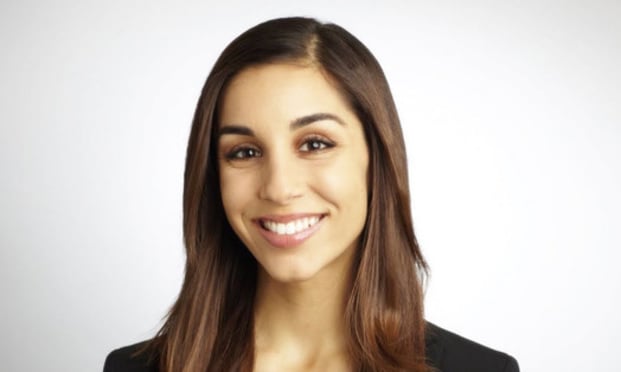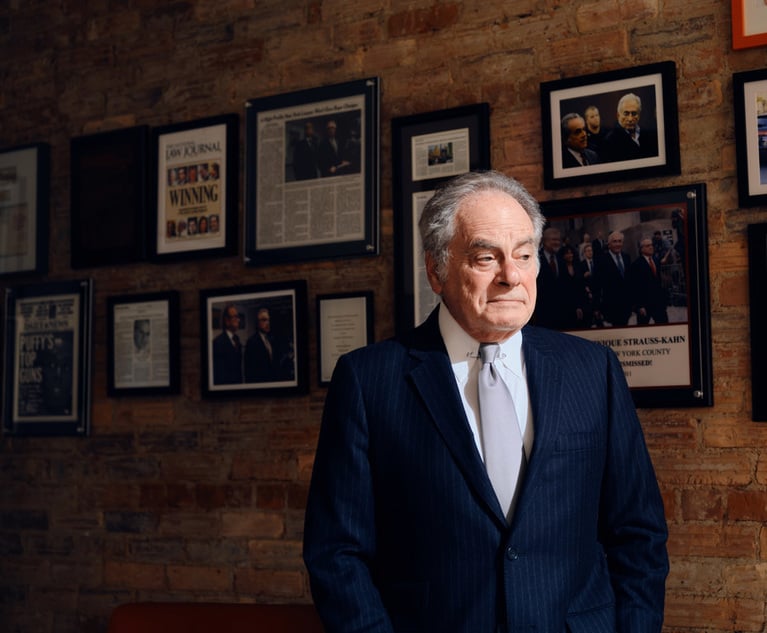Associate Departs Big Law to Create Pro Se Online Startup
Proposed cuts to legal aid nationwide spurred Dorna Moini to take a leap in October and leave Sidley Austin to launch HelpSelf Legal.
January 04, 2018 at 02:03 PM
5 minute read

Although she spent the first six years of her career in Big Law, California attorney Dorna Moini always knew that her true passion was in human rights and access to justice.
After graduating from the University of Southern California Gould School of Law in 2012, Moini, who has dual citizenship in the United States and Iran, worked at Sheppard, Mullin, Richter & Hampton and then at Sidley Austin.
But Big Law practice wasn't her calling. Her experiences gained from frequent travel between the United States and Iran, plus a fellowship as an undergraduate helping draft legislation to outlaw slavery in northwest Africa, and her pro bono work as a Big Law associate provided a window into the stark divide in access to justice here and abroad. And she was driven to do something about it.
“It works great for people who have money,” Moini said.
It was the proposed cuts to legal aid nationwide that spurred Moini to take a leap in October and leave Sidley to launch HelpSelf Legal, an online platform for self-represented litigants to create documents and filings in routine legal matters. HelpSelf's first product is designed to assist domestic violence victims in California. Moini expects to expand to other types of legal matters and more states.
“Hopefully, we'll have a system that will allow people to have much greater success than they would if they were going it on their own,” said Moini, who lives in Los Angeles.
Moini, 30, handles the legal aspects of HelpSelf, and her partner Michael Joseph, a technology engineer, is responsible for building out the online platform. Users pay $15 to access the site, which walks them through user-friendly questions that gather information central to the case and prompts them to upload copies of key evidence and documents. HelpSelf Legal also plans to license its software to California legal aid organizations, charging a sliding scale based on what they can pay.
Moini self-funded the startup with her own savings and said the largest expense so far is Joseph's salary, which she declined to disclose. Moini isn't yet taking a salary for herself.
Moini's interest in access to justice issues is rooted in her experience as a New York University undergraduate student. There, she took a fellowship with Open Society Justice Initiative, a program of New York nonprofit Open Society Foundations, and SOS Esclaves, a Mauritania, Africa-based nongovernment organization. Moini helped draft legislation in Mauritania, in northwest Africa, to create legal ramifications for slave holders, including a 10-year prison sentence, according to Open Society Justice Initiative, which estimated there were 500,000 slaves in Mauritania in 2007 when the law passed.
After her experience in Mauritania, Moini knew that she wanted to become a lawyer. “I saw how much the law could change people's lives,” she recalled.
But Moini decided after law school to join a big firm. Her strategy, she said, was to get the training and background to set her up for future pursuits. She first became a litigation associate at Sheppard Mullin and three years later jumped to Sidley Austin, where as an associate she represented companies involved in employment litigation.
“It was really excellent training,” Moini said. “I think I really developed as a lawyer and public speaker and advocate through working in Big Law.”
Sidley Austin partner Wendy Lazerson in Palo Alto, who worked closely with Moini, said she was sorry to see Moini leave.
“She sees the glass half full at all times,” said Lazerson, who practices employment law. “It makes it much more enjoyable when you have people on your team that see the good in every situation.”
Lazerson said when she learned that Moini was launching HelpSelf to support legal services for the poor, she thought it would fill a need in the community and help legal aid clinics.
“Dorna is somebody who people are drawn to, and she will be successful in whatever she does,” she said. “If she was going to leave Sidley, I was glad to see she was doing it to pursue a passion of hers and something I really support.”
Much of Moini's passion to help self-represented litigants came from her pro bono practice during her Big Law life. She represented domestic violence victims in trial and on appeal, asylum applicants in immigration cases, indigent clients in employment cases and performed some housing work.
“I felt working with those types of people who really need you and can't afford a lawyer was really fulfilling to me. It's much more emotionally rewarding,” she said.
Living in Silicon Valley—surrounded by technology offerings for everything from transportation to dog-sitting—Moini had often thought about using technology to help low- and moderate-income people to access the courts. She said she was prompted to change her career path when President Donald Trump recommended slashing funding to the Legal Services Corp., the nonprofit that distributes funds for civil legal aid across the nation. Congress is still hashing out the final federal budget.
“The resources are continuously being taken away,” Moini said. “I thought there was an opportunity to add technology to make things more efficient.”
Moini's pro bono work with domestic violence victims had taught her the ins and outs of that area of law, which is why HelpSelf Legal launched its first product to help domestic violence victims—which also helps the victim's children out of a bad situation.
“I saw a long-term impact: You help one person, but potentially, you're helping several generations,” she said.
Angela Morris is a freelance reporter. Follow her on Twitter at @AMorrisReports
This content has been archived. It is available through our partners, LexisNexis® and Bloomberg Law.
To view this content, please continue to their sites.
Not a Lexis Subscriber?
Subscribe Now
Not a Bloomberg Law Subscriber?
Subscribe Now
NOT FOR REPRINT
© 2025 ALM Global, LLC, All Rights Reserved. Request academic re-use from www.copyright.com. All other uses, submit a request to [email protected]. For more information visit Asset & Logo Licensing.
You Might Like
View All
A Lesson on the Value of Good Neighbors Amid the Tragedy of the LA Fires

Navigating Twitter's 'Rocky Deal Process' Helped Drive Simpson Thacher's Tech and Telecom Practice

Ben Brafman Reflects on Nearly 50 Years as a Defense Attorney

Like a Life Raft: Ben Brafman Reflects on Nearly 50 Years as a Defense Attorney
Trending Stories
- 1Avantia Publicly Announces Agentic AI Platform Ava
- 2Shifting Sands: May a Court Properly Order the Sale of the Marital Residence During a Divorce’s Pendency?
- 3Joint Custody Awards in New York – The Current Rule
- 4Paul Hastings, Recruiting From Davis Polk, Adds Capital Markets Attorney
- 5Chancery: Common Stock Worthless in 'Jacobson v. Akademos' and Transaction Was Entirely Fair
Who Got The Work
J. Brugh Lower of Gibbons has entered an appearance for industrial equipment supplier Devco Corporation in a pending trademark infringement lawsuit. The suit, accusing the defendant of selling knock-off Graco products, was filed Dec. 18 in New Jersey District Court by Rivkin Radler on behalf of Graco Inc. and Graco Minnesota. The case, assigned to U.S. District Judge Zahid N. Quraishi, is 3:24-cv-11294, Graco Inc. et al v. Devco Corporation.
Who Got The Work
Rebecca Maller-Stein and Kent A. Yalowitz of Arnold & Porter Kaye Scholer have entered their appearances for Hanaco Venture Capital and its executives, Lior Prosor and David Frankel, in a pending securities lawsuit. The action, filed on Dec. 24 in New York Southern District Court by Zell, Aron & Co. on behalf of Goldeneye Advisors, accuses the defendants of negligently and fraudulently managing the plaintiff's $1 million investment. The case, assigned to U.S. District Judge Vernon S. Broderick, is 1:24-cv-09918, Goldeneye Advisors, LLC v. Hanaco Venture Capital, Ltd. et al.
Who Got The Work
Attorneys from A&O Shearman has stepped in as defense counsel for Toronto-Dominion Bank and other defendants in a pending securities class action. The suit, filed Dec. 11 in New York Southern District Court by Bleichmar Fonti & Auld, accuses the defendants of concealing the bank's 'pervasive' deficiencies in regards to its compliance with the Bank Secrecy Act and the quality of its anti-money laundering controls. The case, assigned to U.S. District Judge Arun Subramanian, is 1:24-cv-09445, Gonzalez v. The Toronto-Dominion Bank et al.
Who Got The Work
Crown Castle International, a Pennsylvania company providing shared communications infrastructure, has turned to Luke D. Wolf of Gordon Rees Scully Mansukhani to fend off a pending breach-of-contract lawsuit. The court action, filed Nov. 25 in Michigan Eastern District Court by Hooper Hathaway PC on behalf of The Town Residences LLC, accuses Crown Castle of failing to transfer approximately $30,000 in utility payments from T-Mobile in breach of a roof-top lease and assignment agreement. The case, assigned to U.S. District Judge Susan K. Declercq, is 2:24-cv-13131, The Town Residences LLC v. T-Mobile US, Inc. et al.
Who Got The Work
Wilfred P. Coronato and Daniel M. Schwartz of McCarter & English have stepped in as defense counsel to Electrolux Home Products Inc. in a pending product liability lawsuit. The court action, filed Nov. 26 in New York Eastern District Court by Poulos Lopiccolo PC and Nagel Rice LLP on behalf of David Stern, alleges that the defendant's refrigerators’ drawers and shelving repeatedly break and fall apart within months after purchase. The case, assigned to U.S. District Judge Joan M. Azrack, is 2:24-cv-08204, Stern v. Electrolux Home Products, Inc.
Featured Firms
Law Offices of Gary Martin Hays & Associates, P.C.
(470) 294-1674
Law Offices of Mark E. Salomone
(857) 444-6468
Smith & Hassler
(713) 739-1250






